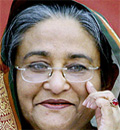
Last week the Election Commission (EC) of Bangladesh was to declare poll schedule for Upazila (sub-district) and Dhaka City Corporation, but it was stopped as Bangladesh Nationalist Party (BNP) finally agreed to sit with EC for the long awaited dialogue that is scheduled for September 20, 2008.
EC told that though they are firm to holding elections in the line of road map, the commission is not intending to take decision unilaterally. It is responsible to hold elections those are credible and acceptable to all concerned.
EC has already completed 3rd phase dialogue with political parties including Bangladesh Awami League (AL), but BNP was absent in all of these demanding release of their detained Chairperson Khaleda Zia and other leaders who were facing corruption charges. Soon after the release of Khaleda Zia and her elder son Tareque Rahman, BNP agreed to sit in the talk that gives EC an extra ability to take decision on election issues.
It is mentionable that EC and of course the military backed interim government had strong intention to hold Upazila election in all 482 units while political parties were demanding parliament poll first. However in the last round of dialogue, the Commission stepped back from their position and said that they could arrange poll in 50 to 70 Upazila prior to the parliament poll.
This back stepping of authorities and random release of persons arrested for graft charges and other misdeeds related to power and corruption certainly made people confused and push them to think about the understanding between military backed interim government and the politicians.
Rashed Khan Menon, one high-flying leftist politician of Bangladesh, commented that all legal process, which was unusually fast in nature, took place in courts when government came to an understanding with the concern political parties.
Meanwhile, a drama had been staged in the politics of Bangladesh. After the release of Khaleda Zia, the standing committee members of BNP took a resolution to make Khaleda Zia a life time Chairperson for the Party. This political performance was seen as a reflection of feudal and autocratic thought process and contradictory to the concept of democracy by all. As this resolution was rejected and criticised by politicians and intellectuals, Khaleda Zia later refused the resolution.
Political annalists stated that this was a drama to build image for Khaleda Zia as her party is in crisis internally and externally. Some of the political analysts said that this initiative was a great joke, surely gentlemen were joking with the norms of democracy.
In the midst of all political happenings, political groupings and regroupings are the very talked about issues in the country now. After the declaration of emergency on January 11, 2007, the BNP led 4-party alliance was shattered. Jamate Islam Bangladesh (Jamat) was mum about the activities of alliance government while trying to circumvent the doings of alliance government.
At the first thrust of anti-graft drive taken by Anti Corruption Commission (ACC) and other agencies, Jamat was almost untouched. And Jamat joined in the dialogue with EC and Government as an individual party. At one stage of anti corruption drive, Amir of Jamat Motiur Rahman Nizami was arrested and after that Jamat had started to get closer with BNP. However, after a few days of arrest, Mr. Nizami managed to have a bail from higher court and finally the 4-party alliance reactivated.
On the other hand, AL led 14-party was in political communication but almost non functional. Before the changeover of January 11, 2007, there was another election alliance named Mohajot (Grand Alliance). Jatio Party of former military autocrat HM Ershad and few other side line parties were the part of that election alliance. From the time of the state of emergency Mohajot was factually non functional. Presently, leaders of this grand alliance including AL are now active to revitalise the election alliance.
In view of the initiatives of military controlled interim government and activities of political parties, people have to be convinced that there might be an understanding between the political parties and the government. But again questions are being emerged in the mind of mass that the misdeeds was done by the powerful and corrupts could be set aside in the name of understanding.
Political observers and analysts said on the issue that in the name of understanding if the true democratic reforms in administration and political institutions, which was a commitment from government and politicians to the nation, abandoned that would be a cruel joke to the people. A credible national election in time, a public administration system complying with democratic norms and truly democratic political institutions are essential for a democratic Bangladesh, they added.
|
|


Comments: